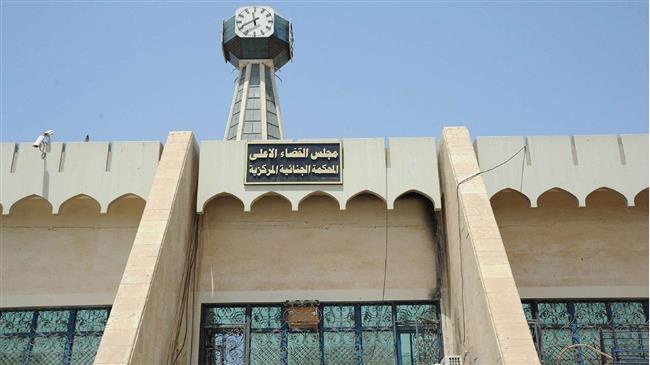
RNA - Abdul Sattar al-Biraqdar, spokesman for Iraq's Supreme Judicial Council, said in a statement that the country’s Central Criminal Court issued the verdicts against the convicts after they confessed to having offered logistic support to the terror outfit and assisted the extremists in their attacks against security and military forces.
On July 8, the Criminal Court of Nineveh sentenced an unnamed Daesh militant to death after he was convicted of killing 16 people at Mosul General Hospital, and planting hundreds of bombs east of the provincial capital city of Mosul, located some 400 kilometers (250 miles) north of Baghdad.
Biraqdar said the convict has confessed to executing civilians, and planting 250 explosive devices across the town of Bartella.
The high-ranking Iraqi judicial official noted the Daesh terrorist had also participated in terrorist attacks against government forces, namely in the area of Ain al-Safra.
Separately, Major General Maan al-Saadi, a security official from the northern oil-rich province of Kirkuk, said members of the Counter-Terrorism Service have disbanded a terrorist cell, and arrested 13 militants who had sneaked into the province in order to carry out bloody terrorist attacks.
On June 30, Iraqi Prime Minister Haider al-Abadi, who is also the commander-in-chief of Iraqi forces, pledged to hunt down Daesh militants across Iraq after recent attacks and abductions carried out by the terrorist group.
“We will chase the remaining cells of terrorism in their hideouts and we will kill them, we will chase them everywhere, in the mountains and the desert,” Abadi said.
According to Press TV, Abadi declared the end of military operations against Daesh in the Arab country on December 9, 2017.
On July 10 that year, the Iraqi prime minister had formally declared victory over Daesh extremists in Mosul, which served as the terrorists’ main urban stronghold in the conflict-ridden Arab country.
In the run-up to Mosul's liberation, Iraqi army soldiers and volunteer Hashd al-Sha’abi fighters had made sweeping gains against Daesh.
The Iraqi forces took control of eastern Mosul in January 2017 after 100 days of fighting, and launched the battle in the west on February 19 last year.
Daesh began a terror campaign in Iraq in 2014, overrunning vast swathes in lightning attacks.
847/940